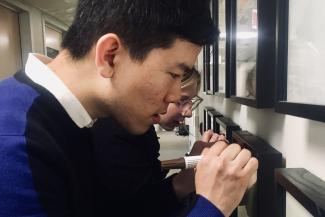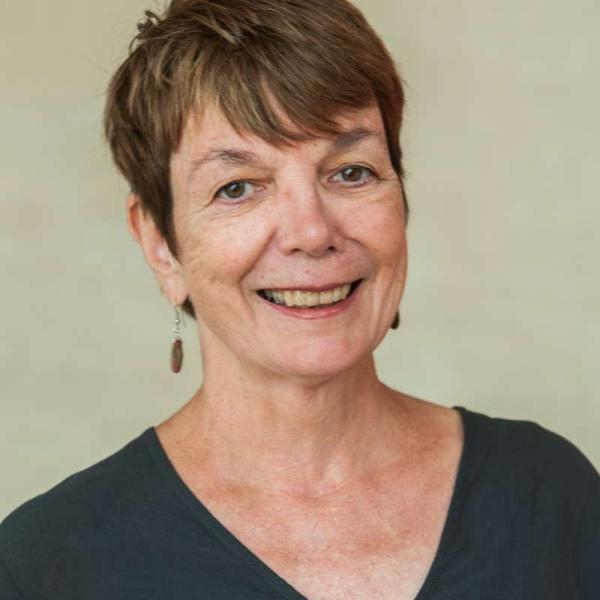
Selected Faculty
Curation-Related Faculty
- Art History Faculty and Curators
- Leora Auslander, History
- Rachel Cohen, Creative Writing
- David Galenson, Economics
- Theaster Gates, Visual Arts and Harris School of Public Policy
- Alice Goff, History
- Morris Fred, Master of Arts Program in the Social Sciences
- Yung-ti Li, East Asian Languages and Civilizations
- Larry Norman, Romance Languages and Literatures
- Geof Oppenheimer, Visual Arts
- James Osborne, Near Eastern Languages and Civilizations
- Ada Palmer, History
- Lawrence Rothfield, English
- Gil Stein, Near Eastern Languages and Civilizations
- Jacqueline Stewart, Cinema and Media Studies
- Paula Worthington, Harris School
Sample Courses
Students choose from courses offered by faculty in Art History and other departments focused on museums, collections or object-driven research. These also include annual courses offered at the Art Institute of Chicago through the Rhoades Exchange Program and Chicago Objects Study Initiative, the Suzanne Deal Booth Seminars in Conservation and Conservation Science, and seminars regularly taught by curatorial staff at the Smart Museum, Neubauer Collegium Exhibitions, and Logan Center Exhibitions.
Outside of the classroom, students benefit from the expertise and mentorship of museum professionals at these institutions and the Institute for the Study of Ancient Cultures, the Campus and Public Art Collections, the Visual Resources Center, the Center for the Art of East Asia, the Regenstein Library’s Special Collections, the Renaissance Society, and more.
Sample courses include:
ARTH 31325 - Monochrome Multitudes (Orianna Cacchione and Christine Mehring)
This seminar traces modern monochrome art as a fundamental if surprisingly expansive artistic practice. Discussions will center on artworks in the eponymous fall 2022 exhibition at the David and Alfred Smart Museum of Art curated by the instructors. We will revisit classic North American Modernism—“essentialist” flatness, idealized form, and color theories—while opening monochrome art up to culturally resonant color, a range of media, and global influence. Student research will enrich and expand existing histories of “the monochrome” by articulating cultural, political, racial, or gendered meanings of monochrome art, emphasizing the significance of materials and media, and engaging North American art in a global dialogue. Students will have the opportunity to contribute their research and writing to the exhibition’s web-based audio app as well as to a research symposium and possible publication.
ARTH 30304 - Ancient Stones in Modern Hands (Seth Estrin and Alice Goff)
This course explores intimate histories of private ownership of antiquities as they appear within literature, visual art, theater, aesthetics, and collecting practices. Focusing on the sensorial, material, and affective dimensions of collecting, we will survey histories of modern classicism that span from the eighteenth century to the present, from the Mediterranean to the Pacific. In addition to primary source materials readings will include scholarship from the fields of gender studies, art history, and the history of emotions.
For an extended listing of classes and descriptions, visit the Art History course page.
Curatorial Studies Specialization
The Curatorial Studies Specialization allows students specializing in Art History to structure their coursework and thesis around the study of the history of museums, collecting, and exhibitions while working within the interdisciplinary academic orientation of the MA Program in Humanities (MAPH) at the University of Chicago. The Curatorial Studies Specialization, which results in a transcript notation, offers an intellectual foundation for curatorial practice in the following ways: graduate-level coursework in Art History taught by practicing curators and at Chicago-area art institutions; the opportunity to connect with curators and arts professionals at events and workshops; the option to write a thesis with a curatorial focus under the supervision of a practicing curator or relevant faculty member; and the opportunity to apply for jobs and internships at campus art institutions. MAPH students doing the Curatorial Studies Specialization can take all of their classes in Art History, or explore offerings in other subjects, such as East Asian Languages and Civilizations, English, Theater and Performance Studies, and Visual Arts. The Curatorial Studies Specialization is designed for students looking to strengthen the scholarly foundation of their existing curatorial practice and for students seeking academic training that will prepare them for further curatorial studies or future work in the museum or gallery field.
MAPH students who complete the following requirements will receive a Curatorial Studies notation on their transcript:
- MAPH Core Course (Foundations of Interpretive Theory)
- Approaches to Art History
- Three graduate-level elective classes in Art History with at least one focused on museums, collections, object-driven skills, and/or curatorial practice
- Three professional development workshops
- An MA thesis in art history written under the supervision of an Art History faculty member, university-based curator, or relevant faculty member from another department
- A related internship is highly recommended but not required
Please direct any questions you may have about specializing in Curatorial Studies to maph-support@uchicago.edu.
Recent Curatorial Thesis Projects
“Transcending Time and Form: Reimagining Gandhara, Rethinking Curatorial Practice”
Guanhong Liu, MAPH ‘25
Advisor: Wei-Cheng Lin
"The Dirt in the Room: Exhibiting Walter De Maria’s Earth Room"
Ellis LeBlanc, MAPH '21
Advisor: Christine Mehring
"Rendering Opacity: An Exhibition Proposal"
Carla Nuñez-Hernandez, MAPH '21
Advisor: Megan Sullivan
"Ethics on Display: An Analysis of the Field Museum’s “Apsàalooke Women and Warriors” Exhibition"
Emily O'Brien, MAPH '20
Advisor: Claudia Brittenham
MAPH Alumni in Curatorial Roles

Tyler Blackwell, MAPH '18
Cynthia Woods Mitchell Associate Curator, Blaffer Museum, University of Houston
"MAPH really helped me to more firmly establish the necessary foundations of theory, scholarly rigor, and methodological practices that I think are extremely important for any art museum curator. I am also especially grateful for the flexibility MAPH allowed for in terms of course offerings, thesis development, and faculty resources."
Amanda Block, MAPH '15
Research Assistant to the Deputy Director for Curatorial Affairs, Art Institute of Chicago
"The research and writing skills that I developed through MAPH continue to be absolutely essential to my work on a daily basis. Cultivating a broad understanding of the humanities while at the same time rigorously training as an art historian has proven critical to my work––not only my understanding of the museum's collection and exhibition program but also of the audiences we seek to engage."
Erica Cooke, MAPH '11
Research Fellow in the Department of Painting and Sculpture at the Museum of Modern Art (MoMA, New York)
"MAPH gave me the ability to think historically about the curatorial projects that I’m involved in. Also writing skills are necessary for any curatorial work (from research to loan letters to exhibition catalogue essays to wall didactics) and my classes at UChicago were especially notable for assigning writing exercises with exceptional range."
Flavia Frigeri, MAPH '08
Independent Curator and Teaching Fellow, History of Art Department, University College London
"MAPH helped me develop a greater understanding of key art historical discourses that I find myself constantly coming back to when developing an idea for an exhibition. Secondly and perhaps most importantly, it was during my time at UChicago that I identified my so-called field of expertise, namely Post-war Italian art."



